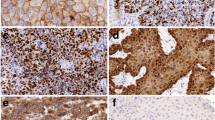Abstract
Connective tissue growth factor (CTGF) has been reported to play critical roles in the tumorigenesis of several human malignancies. This study was performed to evaluate CTGF protein expression in head and neck squamous cell carcinoma (HNSCC). Surgical specimens from 76 primary HNSCC were obtained with written informed consents and the expression level of CTGF was immunohistochemically evaluated. The cytoplasmic immunoreactivity of CTGF in cancer cells was semiquantitatively classified into low and high expression. Among all 76 cases with or without neoadjuvant therapy, low CTGF showed significantly longer (P = 0.0282) overall survival (OS), but not disease-free survival (DFS) than high CTGF. Although low CTGF in patients with stage I, II and III did not result in any significant difference of the OS and DFS, stage IV HNSCC patients with low CTGF showed significantly longer OS (P = 0.032) and DFS (P = 0.0107) than those with high CTGF. These differences in stage IV cases were also confirmed using multivariate analyses. These results suggest that low CTGF in stage IV HNSCC is an independent prognostic factor, despite with or without neoadjuvant therapy.




Similar content being viewed by others
References
Goon PK, Stanley MA, Ebmeyer J, et al. HPV & head and neck cancer: a descriptive update. Head Neck Oncol. 2009;1:36.
Brigstock DR. The CCN family: a new stimulus package. J Endocrinol. 2003;178:169–75.
Bennewith KL, Huang X, Ham GM, et al. The role of tumor cell-derived connective tissue growth factor (CTGF/CCN2) in pancreatic tumor growth. Cancer Res. 2009;69:775–84.
Chang CC, Lin MT, Lin BR, et al. Effect of connective tissue growth factor on hypoxia-inducible factor 1 alpha degradation and tumor angiogenesis. J Natl Cancer Inst. 2006;98:946–8.
Deng YZ, Chen PP, Wang Y, et al. Connective tissue growth factor is overexpressed in esophageal squamous cell carcinoma and promotes tumorigenicity through beta-catenin-T cell factor/Lef signaling. J Biol Chem. 2007;282:36571–81.
Dhar A, Ray A. The CCN family proteins in carcinogenesis. Exp Oncol. 2010;32:2–9.
Jiang CG, Lv L, Liu FR, et al. Downregulation of connective tissue growth factor inhibits the growth and invasion of gastric cancer cells and attenuates peritoneal dissemination. Mol Cancer. 2011;10:122.
Liu LY, Han YC, Wu SH, Lv ZH. Expression of connective tissue growth factor in tumor tissues is an independent predictor of poor prognosis in patients with gastric cancer. World J Gastroenterol. 2008;14:2110–4.
Pandey DP, Lappano R, Albanito L, Madeo A, Maggiolini M, Picard D. Estrogenic GRP30 signaling induces proliferation and migration of breast cancer cells through CTGF. EMBO J. 2009;28:523–32.
Sala-Torra O, Gundacker HM, Stirewalt DL, et al. Connective tissue growth factor (CTGF) expression and outcome in adult patients with acute lymphoblastic leukemia. Blood. 2007;109:3080–3.
Shimo T, Kubota T, Goda T, et al. Clinical significance and pathogenic function of connective tissue growth factor (CTGF/CCN2) in osteolytic mandibular squamous cell carcinoma. Anticancer Res. 2008;28:2343–8.
Xie D, Yin D, Wang HJ, et al. Levels of expression of CYR61 and CTGF are prognostic for tumor progression and survival of individuals with gliomas. Clin Cancer Res. 2004;10:2072–81.
Yang F, Tuxhorn JA, Ressler SJ, McAlhany SJ, Dang TD, Rowley DR. Stromal expression of connective tissue growth factor promotes angiogenesis and prostate cancer tumorigenesis. Cancer Res. 2005;65:8887–95.
Zhou ZQ, Cao WH, Xie JJ, et al. Expression and prognostic significance of THBS1, Cyr61 and CTGF in esophageal squamous cell carcinoma. BMC Cancer. 2009;22:291.
Chang CC, Shih JY, Jeng YM, et al. Connective tissue growth factor and its role in lung adenocarcinoma invasion and metastasis. J Natl Cancer Inst. 2004;96:364–75.
Chien W, Yin D, Gui D, et al. Suppression of cell proliferation and signaling transduction by connective tissue growth factor in non-small cell lung cancer cells. Mol Cancer Res. 2006;4:591–8.
Kikuchi R, Tsuda H, Kanai Y, et al. Promoter hypermethylation contributes to frequent inactivation of a putative conditional tumor suppressor gene connective tissue growth factor in ovarian cancer. Cancer Res. 2007;67:7095–105.
Mullis TC, Tang X, Chong KT. Expression of connective tissue growth factor (CTGF/CCN2) in head and neck squamous cell carcinoma. J Clin Pathol. 2008;61:606–10.
Chu CY, Chang CC, Prakash E, Kuo ML. Connective tissue growth factor (CTGF) and cancer progression. J Biomed Sci. 2008;15:675–85.
Moritani NH, Kubota S, Nishida T, et al. Suppressive effect of overexpressed connective tissue growth factor on tumor cell growth in a human oral squamous cell carcinoma-derived cell line. Cancer Lett. 2003;192:205–14.
Yang MH, Lin BR, Chang CH, et al. Connective tissue growth factor modulates oral squamous cell carcinoma invasion by activating a miR-504/FOXP1 signalling. Oncogene. 2012;31:2401–11.
Cheng CC, Wen HH, Chen CW, et al. Connective tissue growth factor activates pluripotency genes and mesenchymal-epithelial transition in head and neck cancer cells. Cancer Res. 2013;73:4147–57.
Garavello W, Ciardo A, Spreafico R, Gaini RM. Risk factors for distant metastases in head and neck squamous cell carcinoma. Arch Otolaryngol Head Neck Surg. 2006;132:762–6.
Ko C, Citrin D. Radiotherapy for the management of locally advanced squamous cell carcinoma of the head and neck. Oral Dis. 2009;15:121–32.
Sobin LH, Wittekind C, TNM classification of malignant tumours. In: International Union Against Cancer (UICC) 6th ed. New York: Wiley-Liss; 2002. p. 19–52.
Acknowledgments
This study was supported in part by a Grant-in-Aid for the Promotion of Defense Medicine from the Ministry of Defense of Japan (H.T., O.M.); a grant from the Foundation for the Promotion of Defense Medicine from the Ministry of Defense of Japan (H.T.); and a Grant-in-Aid for Young Scientists (B) from the Ministry of Education, Culture, Sports, Science and Technology, Japan (R.K.). We thank Ms. Kozue Suzuki for technical assistance.
Conflict of interest
The authors declare no conflicts of interest.
Author information
Authors and Affiliations
Corresponding author
Rights and permissions
About this article
Cite this article
Kikuchi, R., Kikuchi, Y., Tsuda, H. et al. The expression and clinical significance of connective tissue growth factor in advanced head and neck squamous cell cancer. Human Cell 27, 121–128 (2014). https://doi.org/10.1007/s13577-014-0092-0
Received:
Accepted:
Published:
Issue Date:
DOI: https://doi.org/10.1007/s13577-014-0092-0




